Wife of Iranian-Swedish Prisoner Left Out of Prisoner Swap Condemns Deal
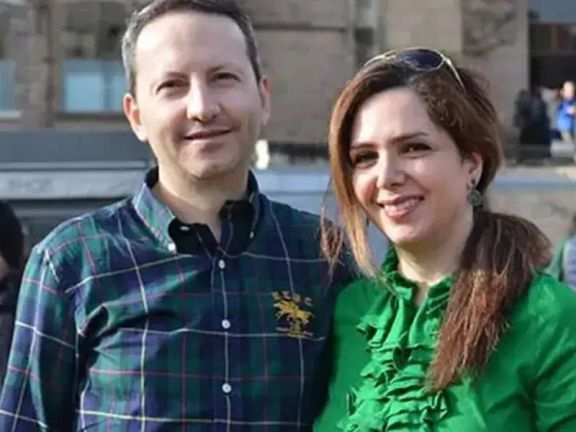
The wife of Ahmadreza Jalali, a political prisoner in Iran, has slammed the prisoner swap deal between Sweden and Iran which left her husband behind.

The wife of Ahmadreza Jalali, a political prisoner in Iran, has slammed the prisoner swap deal between Sweden and Iran which left her husband behind.
Speaking to Iran International, Vida Mehrannia labeled the recent prisoner exchange which saw the release of convicted Iranian war criminal Hamid Nouri in Sweden in return for two Swedish citizens imprisoned in Iran, as "ridiculous". Her Swedish-Iranian husband remains behind bars in Iran on charges of espionage, which he denies.
On Saturday, Sweden released former Iranian jailor Hamid Nouri who was serving a life sentence for his role in the 1988 mass executions in Iran, and Iran in turn released Swedish EU diplomat Johan Floderus and Swedish-Iranian citizen Saeid Azizi.
According to Mehrannia, her husband has been subjected to solitary confinement and intensified mistreatment as part of Tehran's strategy to leverage detained foreign nationals and dual citizens.
She told Iran International that authorities have failed to provide any substantial answers or efforts to secure Jalali's release. The family, along with their supporters, had no prior knowledge of the negotiations that led to the recent prisoner exchange, only learning about it through media reports.
Jalali was arrested in 2016. The case, purportedly a retaliation for his refusal to spy for Iran's Revolutionary Guard, led to a death sentence.
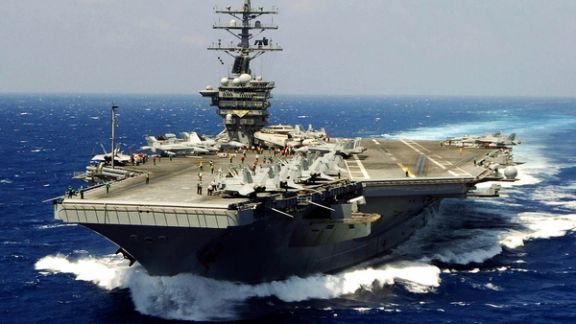
The US Naval Forces Central Command (NAVCENT) said on Sunday that it had rescued the crew from the Liberian-flagged, Greek-owned bulk carrier M/V Tutor that was attacked by Yemen's Iran-backed Houthis on 12 June in the Red Sea.
Sailors assigned to the Dwight D. Eisenhower Carrier Strike Group airlifted the crew out on Saturday, NAVCENT said, adding that one civilian sailor remained missing.
The attack, which occurred near the Yemeni port of Hodeidah, caused severe flooding and damage to the engine room and left the Tutor unable to maneuver.
On Saturday, the United Kingdom Maritime Trade Operations (UKMTO) said the ship's crew was evacuated and that the abandoned vessel was drifting in the Red Sea.
The Houthis claimed responsibility for the small sea craft and missile attacks it used to target the ship as part of their ongoing campaign which they say is in support of the Palestinians and is focused on ships bound for Israel.
Iran supplies weapons to and supports Houthi forces in Yemen, which have been attacking international commercial vessels since November, disrupting a vital maritime route linking Asia with Europe.
The attacks began after Iran's Supreme Leader Ali Khamenei called on Muslim nations in early November to blockade Israeli trade.
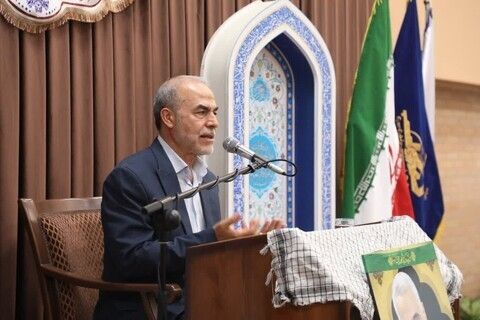
The political deputy of the Islamic Revolutionary Guard Corps expressed concerns over the potential impact of low voter turnout in Iran's June 28 presidential election, attributing it to external threats.
"This issue encourages the enemy to create disturbances, meaning that when the enemy sees a low turnout, it is tempted to create challenges and can describe officials, whether in parliament or the government, as lacking popular support," stated Brigadier General Yadollah Javani.
He said that elections could either enhance Iran's strength or become a point of vulnerability: "Elections can lead to two outcomes; first, becoming a source of power generation, and second, becoming a source of challenge production."
The portrayal comes as recent elections in Iran, particularly the second round of the Parliamentary elections held in March, saw notably low participation, with only a small fraction of eligible voters in Tehran casting their ballots.
As the country prepares to hold a snap presidential election this month, such diminished electoral engagement has been largely attributed to a pervasive dissatisfaction with the political process, exacerbated by economic struggles and social restrictions that further alienate the public from the political establishment.
The situation was aggravated by the nationwide protests following the death of Mahsa Amini in police custody, which led to a crackdown resulting in over 500 deaths. These events starkly highlighted the government's repressive nature and deepened the sense of despair and disconnection from the state, prompting many Iranians to question the effectiveness of the electoral process as a means for achieving reform or influencing government policies.
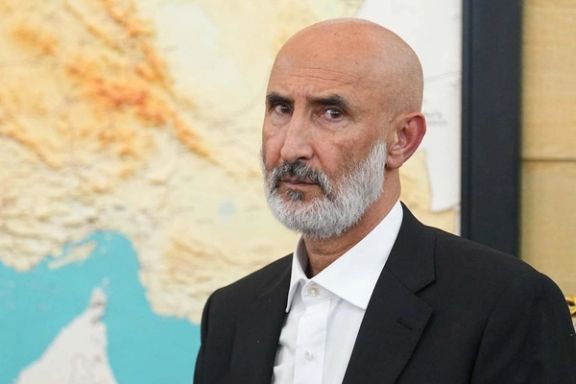
Sweden's release of Hamid Nouri, a former Iranian official convicted of war crimes, in a prisoner exchange with the Islamic Republic, has sparked widespread backlash and public protests.
Adding to the public outrage is the fact that Sweden left behind Ahmadreza Jalali, an Iranian-Swedish scientist sentenced to death in Iran after a sham trial lacking due process. In exchange for Nouri, Iran released two other de facto hostages.
Immediately after the news broke on Saturday, Iranians in Sweden converged outside the foreign ministry in Stockholm to voice their indignation, including Djalali's wife Vida Mehrannia. The gathering underscored a broader international reaction that casts a shadow over Sweden's prisoner exchange with Iran.
Prominent Iranian opposition figure Prince Reza Pahlavi criticized the Swedish Prime Minister's decision to release Hamid Nouri, calling it "an affront to the rule of law, human rights, and basic decency." He condemned the move as "feckless appeasement" of Iran's criminal regime, arguing that it failed to save all hostages and would only encourage more hostage-taking and blackmail.
Alireza Akhondi, a Swedish politician from the Center Party, criticized the Swedish Prime Minister's government as "irresponsible" for "abandoning Ahmadreza Djalali." Akhondi described the release of Nouri as an "insult to Sweden's judicial system" and a "cruel blow" to Djalali's family. He suggested that the timing of the prisoner swap was deliberately delayed until after the European Parliament elections to avoid losing votes.
Hamed Esmaeilion, a prominent Canadian Iranian activist and representative of the Association of Families of Flight PS752 Victims, condemned the exchange as a "shameful stain" on Sweden, labeling it as complicity with a regime known for its hostage-taking tactics. "Today justice has been trampled upon," Esmaeilion expressed on social media, highlighting the emotional toll on families affected by Nouri's past atrocities.
In 2022, a Swedish court sentenced Nouri to life imprisonment following his conviction of war crimes for his role in the mass execution of political prisoners in Iran in 1988. Nouri served as the deputy prosecutor of Gohardasht prison in Karaj city near Tehran in 1988, according to the Swedish court. He was arrested at Stockholm airport in 2019 during his visit to Sweden, under the principle of universal jurisdiction.
Iranian Nobel laureate Shirin Ebadi echoed similar sentiments, criticizing the move as detrimental to the cause of justice.
Journalist and rights activist Masih Alinejad further emphasized that the extradition represents a betrayal of human rights.
“It is a profound betrayal of human rights and a grievous affront to the efforts of justice-seeking families from the 1980s who strive to hold these criminals accountable. This action disregards Sweden’s independent judiciary, which rightfully sentenced this criminal to life imprisonment, and emboldens and strengthens a bloodthirsty regime,” she wrote.
Athena Daemi, another human rights activist, remarked on the predictability of Nouri's release, criticizing European nations for facilitating such exchanges at the expense of standing firm against the Islamic Republic's abuses.
As Nouri returned to Iran in exchange for two Swedish citizens, EU Foreign Policy Chief Josep Borrell expressed relief over the Swedes' release while thanking Oman for its mediation.
Yet, the broader implications of this swap continue to stir controversy and debate about the ethics of negotiating with regimes accused of severe human rights violations.
Critics argue that such swaps might undermine international legal standards by effectively rewarding countries that detain foreigners on dubious grounds. The return of Nouri, in particular, raises ethical questions about the implications of negotiating with governments accused of severe human rights violations.
The United States last year released around $6 billion in Iran's frozen funds to secure the release of five dual nationals arrested on trumped-up charges and held in Iran. That arrangement raised strong public criticism about rewarding hostage taking.
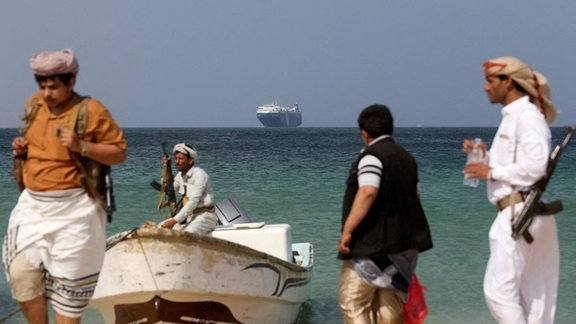
The United Kingdom Maritime Trade Operations (UKMTO) said on Saturday the crew of a Palau-flagged cargo ship had been evacuated and the ship was on fire and sinking, referring to an incident that happened 98 nautical miles east of Yemen's Aden on June 13.
Missiles fired by Yemen's Houthi militants struck the Verbena in the Gulf of Aden on Thursday, sparking a fire and severely injuring one of its crew, U.S. Central Command said.
The Iran-allied Houthis have launched dozens of attacks on international shipping in the Red Sea region since November for what they say is solidarity with Palestinians in the war between Israel and Hamas.
The attacks began after Iran's Supreme Leader Ali Khamenei urged Muslim nations to blockade Israel's trade routes. The United States and Britain have launched air strikes against Houthi military targets since January, but the militant group receiving arms and support from Iran has continued its campaign.
The Houthi campaign in the Red Sea region has disrupted global shipping, cascading delays and costs through supply chains. The militants have sunk one ship, seized another vessel and killed three seafarers in separate attacks.
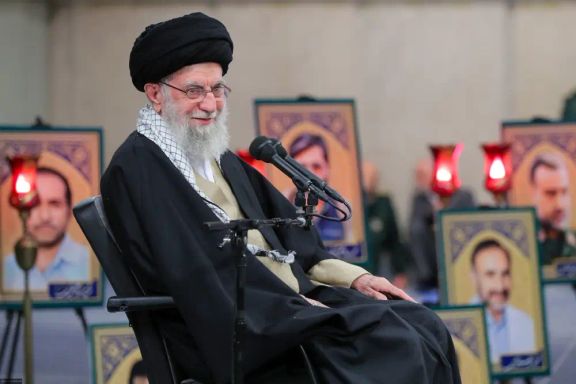
Iran's Supreme Leader, Ali Khamenei, called for increased voter participation in the snap presidential elections on June 28, amidst growing concerns about voter apathy and the overall legitimacy of the electoral process.
"Elections are very important, strive to increase participation, and choose wisely based on who has the capability to work according to the criteria of the revolution," Khamenei stated during a Saturday meeting with a group of so-called young elites.
Despite Khamenei's push for greater electoral engagement, the pervasive atmosphere is one of disillusionment. The Guardian Council, appointed by Khamenei, has extensively disqualified numerous candidates, leaving a narrow field overwhelmingly composed of his staunch supporters. Out of six candidates running, five are ardent followers of Khamenei, while the sole candidate with moderate leanings has also demonstrated loyalty to him on national television.
Voter participation in tightly controlled elections has gradually fallen since 2020, when Khamenei's hardline supporters began disqualifying hundreds of other regime loyalists from parliamentary and presidential elections.
The restrictions, coupled with economic struggles and crackdowns on protestors, have deepened public skepticism about the elections. Many Iranians view the process as heavily orchestrated, offering little in terms of political choice or the prospect of meaningful change. The political landscape within the Islamic Republic remains controlled, and with such a list of candidates, few voters see the upcoming elections as a true opportunity to influence the country’s direction.